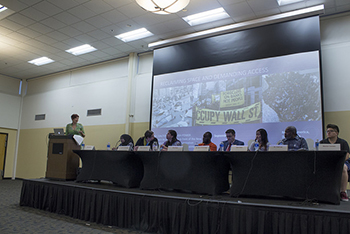
Michaela Gaffke / Winonan
Winona State hosted “Unpacking the Social Justice and Inequalities Knapsack,” which featured a panel of students and faculty that encouraged listening, learning and finding ways to positively change the community on the evening of Monday, Sept. 19 in East Hall.
The panel exposed the unearned entitlements at Winona State, calling specific attention to white privilege.
The student panelists each talked about their own experiences on campus and were asked questions from audience members. Professor Mary Jo Klinker and Director of Inclusion and Diversity Alexander Hines collaborated to put the panel together.
The panelists included students Nasro Abbas, a fourth-year student, Kate Zdon, a second-year student, Marion Canales, a third-year student, Fritz Rock, a graduate student and Aaron Camacho, a fourth-year student. The faculty panelists were professor Jennifer Chernega, professor Fred Lee and Alex Kromminga, director of student conduct and citizenship. Klinker moderated the panel.
One of Camacho’s speaking points were the many artworks on campus depicting indigenous people that were not created by indigenous people themselves. The KEAP Center is the only place on campus that indigenous artwork is created by indigenous people.
“Even in the hall that we are talking about injustices there is a status of an indigenous person by a white person,” Camacho said, pointing out the statue that sits in East Hall.
Canales talked about her experience with picking battles. She said she hears racism on campus and asks herself if it is even worth educating privileged people. When she does point out the racism, she is met with anger and defensiveness.
“Folks need to check their privilege, then make changes,” she said.
Canales looks forward to faculty and staff taking charge of change on campus.
Abbas also spoke of how the deaths of black people in this country need to be addressed.
These issues are in the fabric of our country and we need to take responsibility, Abbas said.
Abbas has had alienating experiences being the only person of color in some of her classes, and said students should not have to feel that way.
An audience member asked if it is the responsibility of minority people to educate others.
“No, this is an institution of higher learning and this shouldn’t fall on me. We’re adults, we should find those avenues ourselves,” Abbas answered.
Camacho agreed with Abbas. She said she can only teach from her own experiences, and if she has a moment to teach she would do so nicely.
It’s not our job to educate you, and I can’t speak for other students, Canales said.
An audience member mentioned how she is often expected to speak for her entire culture when people ask her questions and ask the panel for advice on how to address the situation.
“I am not a spokesman for all people of color and that is insulting,” Lee said.
Abbas said her existence is intersectional, because she is a Black Muslim American.
“It is not about the struggle Olympics and who is struggling more than others,” she said. “We need to understand different experiences.
The last question an audience member asked, was “where should we start with changes at Winona State and where do we go?”
“It’s important for marginalized students to have a sense of community on campus,” Camacho said. “She didn’t know about the inclusion office until the end of her first year.”
Be at the forefront to make changes happen, Canales said, and the faculty needs to take action.
The panelists each had their own reasons to speak on the topic.
“I chose to join the panel as a way to voice my social justice concerns on campus as well as to provide my own experiences and insights for students, faculty and staff to consider when claiming to be a solution to the problems folks face on and off this campus,” Canales said. “I needed my voice to be heard and I plan to continue doing so.”
“The reason I chose to participate was because I believe it is important for the university to create a dialogue about important matters such as the ones discussed on the panel,” Abbas said.
“While working with faculty for an ethnic studies minor, I thought it would be a good way to get my perspective out there,” Zdon said.
Klinker discussed the use of collaboration between students of faculty in order to combat issues of discrimination and privilege.
Abbas said, “I think the issues raised really need to be brought to the university consciousness. It is only through the open discussion of these matters that we can strive to effect lasting change.”
-By Michaela Gaffke







































